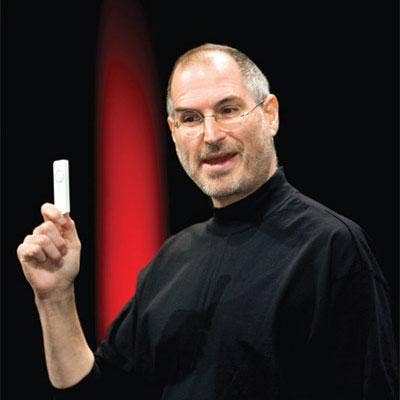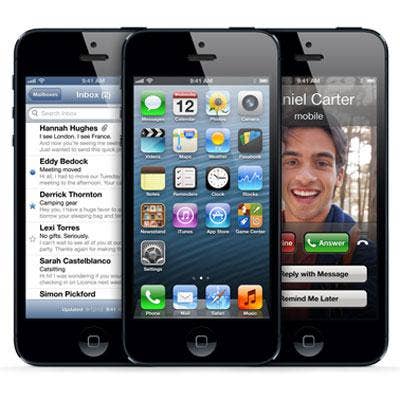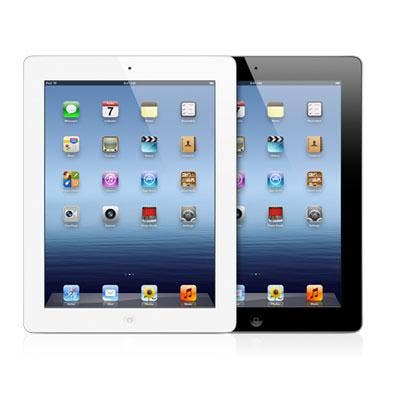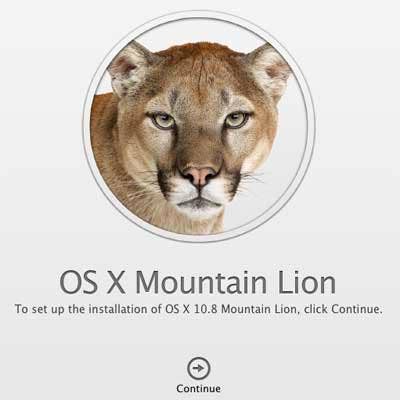10 Recent Apple Milestones That Would Make Steve Jobs Proud

The Legend Lives On
When late Apple CEO Steve Jobs passed away on Oct. 5, 2011, Tim Cook had some big shoes to fill. As Jobs' successor, he was tasked with maintaining that iconic Apple brand Jobs had worked so hard to build during his 14 years at the helm.
And now, one year later, it's obvious Cook can play the part. Whether it's the launch of the new iPhone 5 or Apple's high-stakes legal victory over archrival Samsung, Cook has not only retained Apple's massive fanbase but also helped it grow.
In honor of one of technology's greatest visionaries, here are 10 recent Apple milestones that would have done Steve Jobs proud.

Apple's $1.05 Billion Victory Over Samsung
Steve Jobs wasn't afraid to tell the world how he felt about Android. The Apple front man went so far as to tell biographer Walter Isaacson that he wanted to "destroy" Google's mobile OS, which he considered a low-blow imitation of Apple's own iOS.
"I'm going to destroy Android, because it's a stolen product," Jobs says in Isaacson's book, "Steve Jobs: A Biography," adding that "I'm willing to go thermonuclear war on this."
So when Apple in August pulled out a major $1.05 billion victory over Samsung, whose popular Galaxy smartphones are largely to thank for Android's rise to fame, Jobs would have definitely been pleased with the outcome. Samsung was found guilty of willfully infringing on Apple's designs for the iPad and iPhone and may ultimately see some of its products banned permanently from U.S. shelves.

The iPhone 5
The iPhone 5 launched in September with a display that's longer and thinner than its predecessors. But, part of what has made that new phone so popular (Apple sold more than 5 million of them during the first three days on the market) is that it's not too different from earlier models, touting that same simple design Jobs spent all those years perfecting.
Needless to say, he would likely be happy to see that his style lives on in Apple's newest smartphone.
"That’s been one of my mantras -- focus and simplicity. Simple can be harder than complex: You have to work hard to get your thinking clean to make it simple," Jobs told BusinessWeek in 1998. "But it's worth it in the end because once you get there, you can move mountains."

Apple Becoming Most Valued Public Company
In August, Apple became the world's most valuable public company with a record market capitalization of $623 billion. It marked the highest market cap of any publicly traded company in history, with Apple shares coming in at a record $664.74.
But, it's not necessarily winning this accolade that would have made Steve Jobs smile -- it's who Apple had to steal the crown from to do so. Prior to Apple, the highest market capitalization of all time was held by Microsoft, which for 12 years held the record after its value peaked at $620.58 billion in December 1999.
Just as he was with Android, Jobs was pretty vocal about his qualms with Microsoft. "The only problem with Microsoft is they just have no taste," Jobs said in a 1996 PBS Documentary. "They have absolutely no taste. And I don't mean that in a small way, I mean that in a big way, in the sense that they don't think of original ideas, and they don't bring much culture into their products."

The New iPad
Just like the iPhone 5, Apple's third-generation iPad successfully maintains that minimalistic design that became synonymous with Steve Jobs.
Released in March, the new iPad has a faster processor and brighter display than Apple's first- and second- generation tablet, but its screen size is still 9.5 inches and the placement of its ports and buttons remained relatively unchanged. Put simply, there's no learning curve for Apple fanatics already in love with the product.
Aesthetics aside, Jobs would likely be pleased with how the new iPad is selling; Apple reported during its third-quarter earnings announcement in July that it sold a whopping 17 million iPads during the three-month period, marking an 84 percent unit increase year over year.

Apple Nixing Google Maps, YouTube
Sure, Apple's new Maps app for iOS 6 isn't exactly being welcomed with open arms by users. But, it did follow through on one of Steve Jobs' greatest ambitions: dealing a blow to Google.
With the arrival of Apple's Maps app, Google Maps got the boot and will no longer come as a native app for the iPhone or iPad. Google-owned video streaming site YouTube was also removed by Apple in iOS 6, in what appeared to be another effort made by the Cupertino giant to distance itself completely from its friend-turned-foe Google.
Ironically, Google CEO Eric Schmidt (pictured) used to be close with Jobs and once even held a seat on Apple's board. But with the arrival of Android, things started to sour, and Jobs wasn't afraid to say so.

Cook's Visit To China
Apple's relationship with China has been in the spotlight for various reasons over the past year, most notably after The New York Times published an investigative report revealing a gross violation of fair labor laws occurring at Apple's Foxconn manufacturing plants.
But Jobs, in an admission that evoked praise from some and criticism from others, famously told President Obama in February 2011 that Apple had zero intentions of ever moving iPhone and iPad production jobs from China to the U.S. When The Times followed up with Apple execs, Apple insiders said China was such a valuable part of Apple's broader production ecosystem not because it's cheaper but because it's faster and more efficient.
So considering Apple CEO Tim Cook went to China in March to chat personally with Foxconn employees and launch a full-scale investigation into their working conditions, Jobs would have likely been glad to see some patching-up of the Apple-China relationship he was so bullish on maintaining.

Apple's Appearance At Black Hat
Jobs, most notably, was said to have a heavy hand when it came to the design of Apple's products. But, the former CEO also took strides to ensure Apple's OS X and iOS operating systems were secure, which is why he would have applauded Apple's debut performance at the security-specific Black Hat conference this year.
According to InformationWeek, Jobs "notably chose" to base OS X, Apple's desktop operating system for Macs, on Unix rather than Linux, because it's more secure. What's more, Jobs was responsible for spearheading Apple's "walled-garden" -- rather than open-sourced -- approach to applications in iOS, which only lets approved applications from the App Store run on iOS-based devices.
Apple ultimately took some heat for its first-ever Black Hat appearance being a brief one, but it was still a milestone for the company, considering its reputation of being mum on all things security.

The New Mountain Lion OS X
Jobs temporarily left Apple in 1985 after clashing with then-CEO John Sculley and being stripped of his management duties by Apple's board of directors. As a result, he founded NeXT, a software company whose NeXTstep operating system would ultimately become the foundation for Apple's Mac OS X when Apple acquired the company (and Jobs along with it) in 1996.
Considering, then, that the Mac OS is essentially Jobs' brainchild, Apple's recent unveiling of Mountain Lion, the next-generation version of OS X, was, in a way, a tip of its hat to its late CEO. When launched in July, Mountain Lion delivered more than 200 new features for Macs, including tighter integration with Facebook and Apple's homegrown cloud service iCloud. Users are also able to synchronize Mountain Lion apps, such as email, reminders and calendar updates, across their iPads and iPhones.

The iPod's Chance To Shine
With all the fuss surrounding the iPhone and iPad these days, it can be easy to forget that Apple's rise to fame started with the iPod. And, as the gadget that laid the foundation for Apple's booming success today, the iPod is no doubt one of Jobs' greatest achievements.
So, the late CEO would probably appreciate the fact that Apple paid homage to the iPod last month by announcing a totally revamped and more colorful lineup. Among them is the new iPod touch, which is the thinnest ever from Apple and features its high-definition Retina display. The new device also runs Apple's latest iOS 6 software and has a 5-megapixel camera.

Apple Nabbing 70 Percent Of Tablet Market
According to a 1993 interview with the Wall Street Journal, making money was never one of Steve Jobs' top aims with Apple.
"Being the richest man in the cemetery doesn't matter to me ... Going to bed at night saying we've done something wonderful ... that's what matters to me," the former-CEO-turned-tech-icon said.
Still, given his ultra-competitive attitude toward Google and Microsoft, it's hard to believe Jobs wouldn't appreciate the fact that Apple was able to capture a whopping 70 percent of the worldwide tablet market during the second quarter of 2012. In a report announcing this news, industry analysts IHS iSuppli referred to Apple as the "the king of all media tablets," having shipped approximately 17 million iPads during the three-month period.